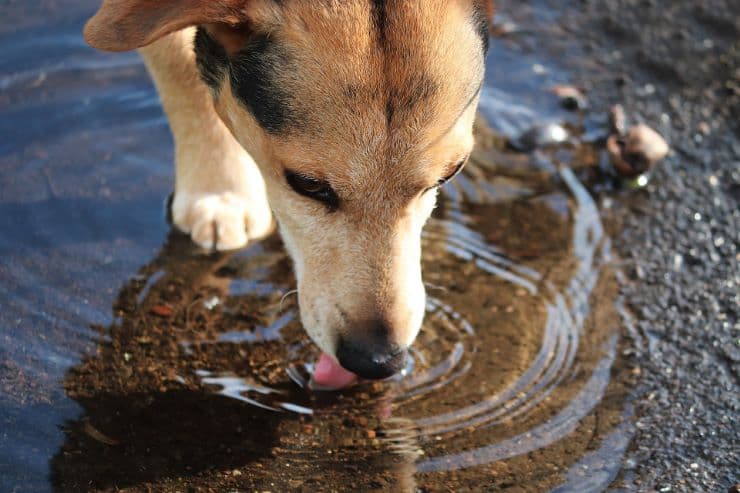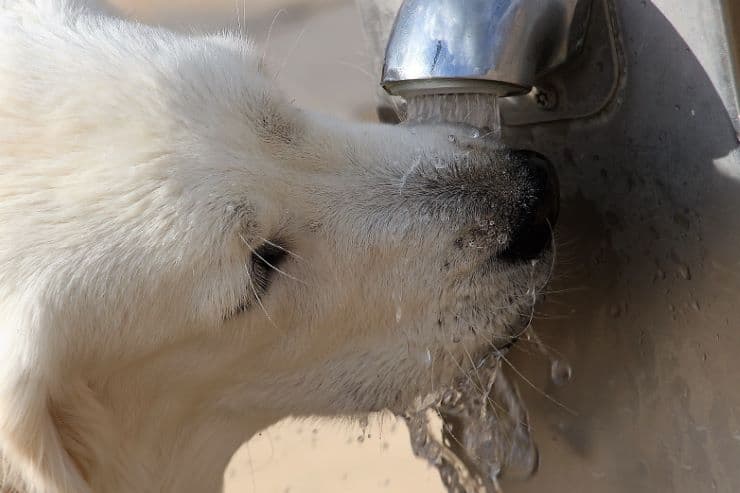Dogs are known for their hearty appetites, but when a furry friend refuses to eat while still drinking water, it can be a cause for concern among pet owners. A sudden change in eating habits can indicate an underlying health issue or may simply be a temporary behavioral change.
In this article, we will explore some of the potential reasons why a dog may stop eating but continue to drink water, helping you better understand your pet's situation and when to seek veterinary advice.

Photo Credit: manfredrichter/Pixabay
Symptoms To Look For
Stress or Anxiety
Dogs can experience stress or anxiety, which may lead to a decreased appetite. Changes in their environment, routine, or the presence of new people or animals can cause stress and affect their eating habits.
Illness or Infection
A common reason for a dog's decreased appetite is an underlying illness or infection. Dogs, like humans, may experience gastrointestinal issues, dental problems, or infections that can make eating uncomfortable or painful. In such cases, the dog may refuse food while continuing to drink water to stay hydrated. Persistent loss of appetite, vomiting, diarrhea, lethargy, or any other concerning symptoms should prompt a visit to the veterinarian for a thorough examination and diagnosis.
Dental Issues
Dental problems, such as gum disease, tooth decay, or broken teeth, can make it difficult and painful for dogs to chew their food. Consequently, they may avoid eating solid food while still consuming water to quench their thirst. It is crucial to regularly check your dog's teeth and gums for signs of inflammation, redness, or dental abnormalities. A dental examination by a veterinarian can help identify and address any dental issues your dog may be experiencing.
Change in Diet or Food Preferences
Dogs can be picky eaters, and a sudden refusal to eat may be due to a change in their food preferences or dissatisfaction with their current diet. If you have recently switched their food brand or made any alterations to their diet, it is possible that your dog simply does not enjoy the new food. In such cases, it may be necessary to experiment with different options to find a diet that appeals to your pet's taste buds while meeting their nutritional needs.
Recent Vaccination or Medication
Some vaccines or medications can temporarily affect a dog's appetite. If your dog had a recent vaccination or started a new medication, it's possible that it could be causing a decreased appetite.
What to try
Add a probiotic
Add a probiotic such as Purina Fortiflora or Puainta on top of the food. Not only can this make the food more palatable, but it can also help any inflamed or irritated intestine heal by rebalancing healthy gastrointestinal flora.

Photo Credit: Puainta Facebook page
Stress relief
If you can identify the stressful triggers, do your best to eliminate them from feeding time. Sometimes, creating a routine for your dog can help them find calm — especially when their stress could be triggered by a change in your routine. Maybe it’s making more scheduled meal times at specific times of the day or creating a mealtime routine (i.e., go for a walk first, then eat).
Add broth to the food
To help your dog eat better, you can add broth to their dry food. Use non-sodium chicken or beef broth and let it soak for several minutes until it softens. Not only will this add flavor to their food, but it will also help them chew and digest it better.
Change the food
Sticking with easy-to-digest natural remedies such as pumpkin, sweet potato, and/or chicken or easy-to-digest dog treats can help get your dog eating and feeling better. Once your dog is back to normal, adding these digestive aids to your dog's daily diet may help.
How long can my dog go without eating but drinking water?
The length of time a dog can go without eating but still drinking water can vary depending on several factors, including the dog's overall health, age, and the underlying cause for the reduced appetite. Dogs are generally more resilient than humans when it comes to fasting, but it's essential to monitor their condition closely and consult with a veterinarian if the situation persists.
As a general guideline, healthy adult dogs can typically go without food for a few days, up to five days, without experiencing significant health risks. However, it's important to note that this is a rough estimate, and individual circumstances may vary. Puppies, small breed dogs, and dogs with specific health conditions may have a lower tolerance for fasting and may need to eat more frequently.
Conclusion
When a dog stops eating but continues to drink water, it can be a sign of various underlying causes. While temporary changes in appetite may not be alarming, persistent refusal to eat accompanied by other concerning symptoms requires veterinary attention. It is essential to monitor your dog's behavior, observe any additional signs, and consult with a veterinarian for a thorough examination and appropriate diagnosis. Remember, the well-being of your beloved pet should always be a top priority.
Also View: Liquid Flavor Enhancer To Boost Your Pet's Appetite

Leave a Reply